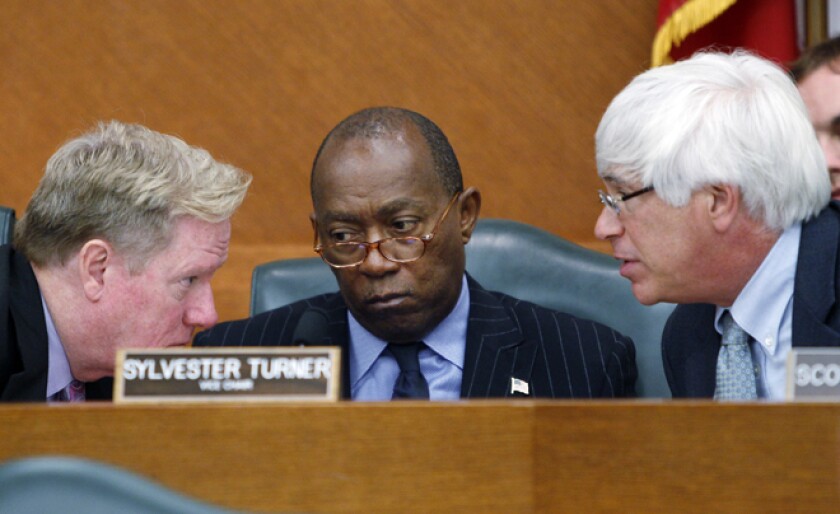Last Updated: Oct. 9, 2015 at 8:47 a.m. to reflect election results in Charlotte and Memphis.
In a time when recent state and congressional elections have gone mostly to Republicans, the one office that Democrats have dominated in recent years is that of big city mayor. That won't change this fall.
In contrast to 2013, when a class of progressive Democrats led by Bill De Blasio of New York took office, this year's races don't suggest major policy changes. Unlike recent campaigns centered on addressing income inequality, most mayoral contests this fall focus on mundane (but important) issues like traffic, budgets and development.
"This crop of candidates is somewhat nuts and bolts," said James Brooks, city solutions director at the National League of Cities.
Already, in 75 of the nation's 100 largest cities, the mayor is a Democrat. Democrats are likely to win control of at least one additional large city, Indianapolis, where Republican Greg Ballard is stepping down. Democrat Joe Hogsett, a former U.S. attorney, is the heavy favorite to succeed him.
"There's no question that he'll win it," said Ed Feigenbaum, editor of the newsletter Indiana Legislative Insight. "He's been the odds-on favorite since day one."
Several incumbents up for re-election this fall are in safe races, including Ed Lee in San Francisco, Buddy Dyer in Orlando, Fla.; Nancy McFarlane in Raleigh, N.C.; and David Bieter in Boise, Idaho.
But there will be new faces in cities such as Charleston, S.C., and Columbus, Ohio, where veteran mayors Joe Riley and Michael Coleman, respectively, are stepping down, and in Philadelphia, where Democratic nominee Jim Kenney is heavily favored to succeed term-limited Mayor Michael Nutter.

Jim Kenney celebrates winning the Democratic primary election for Philadelphia mayor. (AP/Matt Slocum)
Perhaps the big-city race with the least predictable outcome is the one taking place in Houston, where Democrat Annise Parker is also term-limited. Assuming no one takes more than 50 percent of the vote on Nov. 3 -- an almost certain outcome, given the large field -- the two top finishers will advance to a runoff in December.
Texas state Rep. Sylvester Turner, a Democrat, is considered the most likely candidate to proceed, based on his support among African-American voters. "There is a five-way battle for the second spot," said Mark Jones, a political scientist at Rice University, "and at this point, I don't think we can count any of the five out."
One major issue in Houston, and a factor in the mayor's race, is an anti-discrimination measure on the November ballot called HERO, for Houston Equal Rights Ordinance.
"If it's the case that you have a considerable number of conservatives who turn out to vote against the HERO ordinance, then the electorate changes considerably," said Brandon Rottinghaus, a University of Houston political scientist.
The only all-out opponent of HERO among the candidates is former city attorney Ben Hall, a Democrat. But it's not clear that his HERO opposition will be enough win over conservatives, Rottinghaus said, and he doesn't appear to have a strong base of supporters otherwise. The other major candidates are former U.S. Rep. Chris Bell and Sheriff Adrian Garcia on the Democratic side and Republican City Councilman Steve Costello and GOP businessman Bill King.
"This is an election about coalitions, and the candidate who can get his constituency mobilized will be in good shape," said Rottinghaus.

Texas state Rep. Sylvester Turner, center, is a frontrunner in Houston's mayoral race. (AP/Eric Gay)
In Memphis,Tenn., A C Wharton, perhaps the most endangered incumbent big city mayor in the country, lost to City Councilman Jim Strickland on Oct. 8. Wharton easily won a full term in 2011, but unofficial returns show him only garnering 22 percent of the vote this time around. Strickland is the city's first white mayor in 24 years and the first councilmember-turned-mayor since 1972.
In North Carolina, Charlotte voters will choose their fifth mayor since 2013. Charlotte has lost three mayors recently -- one to the Obama administration, one to prison and most recently, Dan Clodfelter lost his bid for re-election to Jennifer Roberts, a former county commissioner, in the city's first Democratic mayoral runoff on Oct. 6. Roberts will face Republican Edwin Peacock in November.

Charlotte Mayor Dan Clodfelter lost his bid for re-election. (Flickr/Knight Foundation)
Turnout for stand-alone municipal elections is almost always anemic, averaging about 25 percent in the 125 largest cities, according to Aaron Weinschenk of the University of Wisconsin-Green Bay.
"You're looking at disengagement with municipal elections," McCorkle said. "The very people who have more to do with your daily life than the president, you're not paying attention to it."
Sam Bermas-Dawes contributed research to this article.
This is part of our 2015 elections coverage. Get more on ballot measures and races here.









